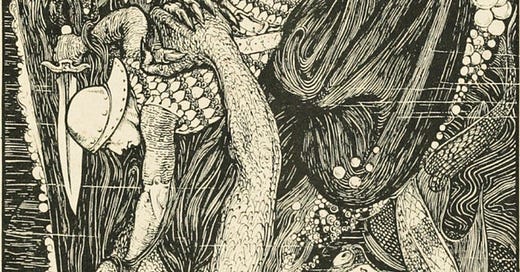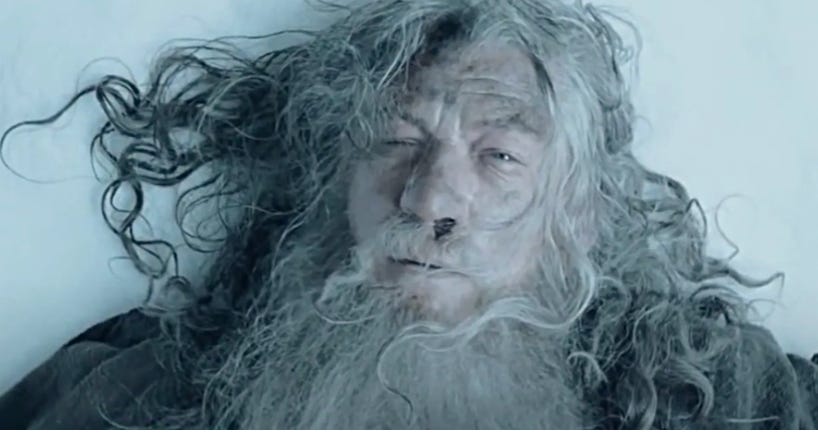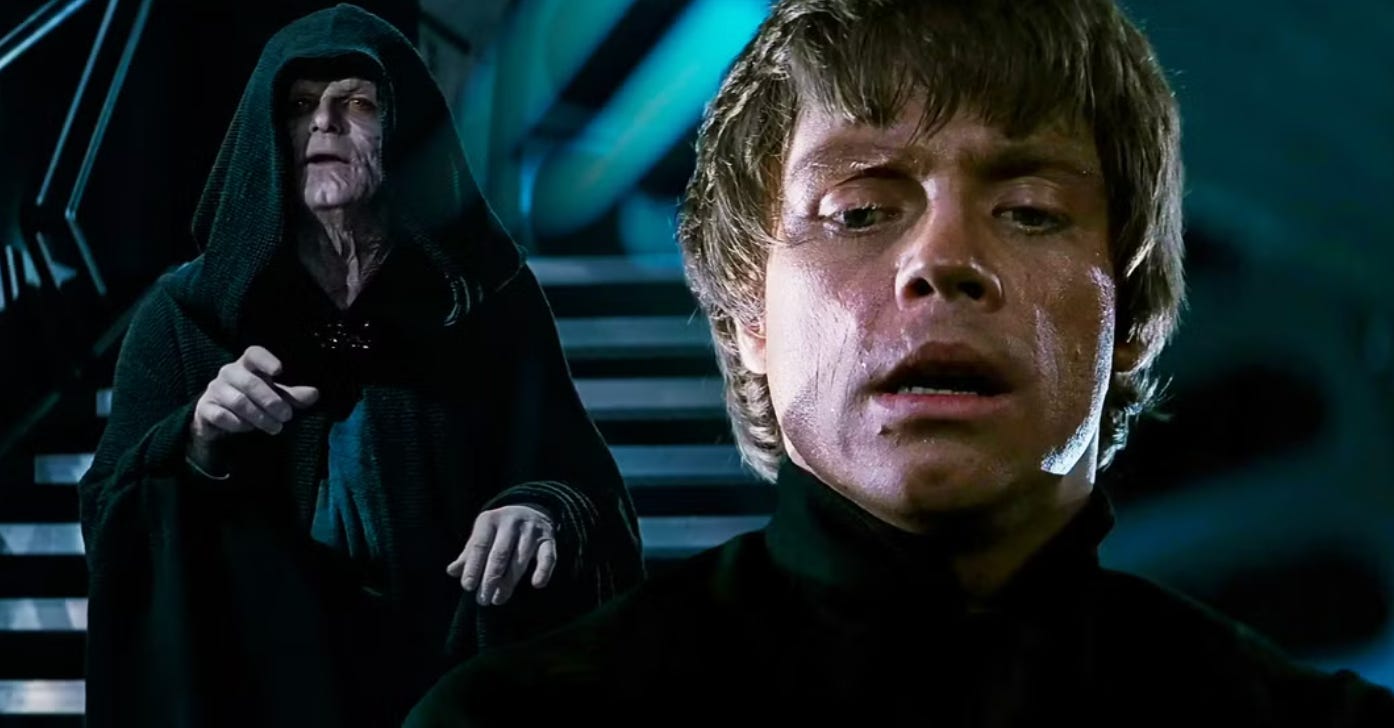The Depths! (Part 4 of 5 in the Shadow Series)
When you reach The Depths, it often means the total collapse of everything you once built your identity around—your worldview, your reputation, your coping mechanisms. Sometimes even your security.
Long before superheroes and Jedi, there was Beowulf.
An ancient warrior. A king in the making. The oldest surviving English-language story. But more than that, it’s a raw, mythic map of what it means to face the monsters within.
You may know the name. Maybe you were forced to skim the poem in high school. But here’s the setup:
Beowulf, a brave warrior from across the sea, arrives in Denmark to help a troubled king whose kingdom is being ravaged by a creature named Grendel. Beowulf slays Grendel in a dramatic battle, tearing the monster’s arm off with his bare hands. Victory, right?
Not quite.
Grendel’s mother—a far more terrifying beast—rises from the depths of a dark, cursed lake to avenge her son. And Beowulf, true to form, arms himself and dives in after her.
He sinks deep into black water. He’s pulled down to her underwater lair. No one expects him to return. His warriors on the shore watch blood rise to the surface and assume the worst.
But below, Beowulf fights for his life—and something more.
This moment in the poem isn’t just the climax of a monster story. It’s a metaphor that echoes across every great tale and every soul that’s ever gone through transformation:
To become something new, you must first descend.
Welcome to the fourth movement in the Shadow Series. We’ve encountered the belly of the whale. We’ve met the shadow in the cave. And last time, we talked about the crushing weight of the Dark Night of the Soul.
Now comes the plunge.
This is The Depths.
This is where you fall deeper than ever before.
This is where something old has to die—so something new can rise.
Let’s go there together.
Grendel vs. Grendel’s Mother
Here’s the twist that most people miss:
Grendel isn’t the real villain.
He’s terrifying, yes. He’s the shadow monster rampaging the mead hall. But he’s just the first layer of fear. Beowulf defeats him with brute strength, pride, and sheer courage.
But then comes his mother.
She’s older. Deeper. She lives in the dark lake—the underworld of the psyche. She’s not just a monster… she’s the source of monsters.
Grendel is the cave—the fear we face first and conquer. The visible threat.
But his mother is the depths.
She is the origin of our fear. The birther of the shadow. When we think we’ve gone as deep as we can go, when we think we’ve faced our shadow and won—that’s when we meet her.
The Mother of the Shadow.
She’s the thing that created the thing that tormented us.
In Jungian terms, she represents the root of the complex. The original wound. The deep insecurity. The unmet need. The trauma we didn’t even know we were still carrying. Grendel is scary, but he’s manageable. His mother is mythic—a force of darkness that can’t be punched away. She has to be faced, understood, and transcended.
Beowulf’s descent isn’t just a continuation of the fight. It’s a transformation of the fight itself.
From physical to spiritual.
From external to internal.
From shadow… to source.
Descent Stories: This Theme Keeps Coming Back
Beowulf’s Underwater Battle: After slaying Grendel, Beowulf dives into a hellish lake to face Grendel’s mother. Down there he nearly meets his end, but ultimately he finds a giant’s sword and uses it to kill the beast. In that moment, “a light appeared and the place brightened – the way the sky does when heaven’s candle is shining clearly.” The dark lair is illuminated. Beowulf resurfaces carrying the monster’s head, victorious and changed. He didn’t just defeat the enemy—he faced the origin of fear itself.
Gandalf and the Balrog: In The Lord of the Rings, Gandalf the Grey falls into the abyss while battling the Balrog. They fall for what seems like days, from the mountains to the deepest lake. Gandalf dies on that peak—but returns as Gandalf the White. “Darkness took me, and I strayed out of thought and time… Naked I was sent back.” It’s the death of an old self and rebirth into something more.
Luke Skywalker vs. the Emperor: In Return of the Jedi, Luke willingly descends into the Death Star to face Darth Vader and the Emperor. The Emperor isn’t just a villain—he’s a dark, seductive force. He offers Luke everything he secretly wants: power, legacy, approval. This is Luke’s Mother of the Shadow moment. The Emperor is the father-figure who births all of Luke’s inner conflict. Luke’s desire for connection with his father, for meaning, for identity—it all gets weaponized in that throne room. Luke must face his own desire for power and acceptance. He throws down his weapon. And in doing so, he breaks the cycle. He defeats the Emperor—not by killing him, but by refusing to become him. In that act of surrender, Luke even redeems his own father. Through facing the depths of shadow, Luke gains restoration.
Jesus in the Tomb: Jesus is crucified and buried. Three days of silence, despair, and darkness. As the Apostles’ Creed puts it, “He descended into hell.” Even in the earliest Christian liturgies, the language of depth, of descent, was baked into the story. The disciples think it’s over. But transformation is coming. Jesus descends into death. But, the tomb is not the end. It’s the threshold of something new.
The Necessary Death
In our own lives, The Depths looks like loss, despair, grief, and surrender. A dream dies. A relationship ends. A belief system collapses. The person we thought we were disappears.
I’ve walked through a season like that recently. Letting go of a dream I loved. Watching something I built come to an end. It was painful. Disorienting. There were days I felt underwater, unsure if I’d ever come up for air.
But I’ve come to believe this:
Sometimes we need to euthanize and eulogize the very story that made us who we are—to become who we were always meant to be.
It’s not easy. But it’s the only way.
What Comes Next
But before we rise, let’s be honest about what this death feels like.
Because it does feel like death.
Not metaphorically. Not poetically. It feels like everything is gone.
When you reach The Depths, it often means the total collapse of everything you once built your identity around—your worldview, your reputation, your coping mechanisms. Sometimes even your financial security, your relationships, your health.
It all falls apart.
This is what ego death looks like. The old self crumbles. The scaffolding that held your life together disappears. You’re stripped bare.
You are naked.
You are alone.
You are defeated.
And the terrifying part is… no one can do this part for you. It’s an unmaking. A personal apocalypse. And even if someone is sitting next to you, you feel cosmically alone.
It feels like death because it is a death.
A death to self. To ego. To illusion.
And it’s only when we finally surrender to that death—when we stop fighting the collapse—that transformation can even begin.
Life Always Follows Death
We don’t stay in the depths. At least, not forever.
The story moves on. Beowulf surfaces. Gandalf returns. Luke escapes. Jesus rises.
The descent is real—but so is the resurrection.
Next time, we’ll explore the final part of this series.
The moment of emergence. Of light. Of new life.
Your resurrection is coming. Stay tuned.







Lordy you're a great writer!